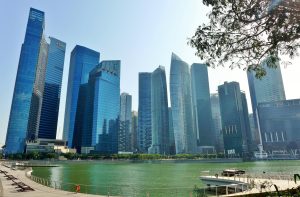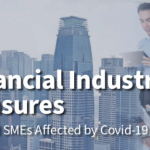Investment volume remained muted in 1Q2020 with sale of Government Land Sales dominating investment sales in 1st Quarter of 2020
 Investment volume remained muted in 1Q2020 with a transaction volume of $3.02 billion, a 37 per cent reduction in volume from the fourth quarter of 2019. Cushman & Wakefield (C&W) who reported that investment volume remained muted said, “the 1Q 2020 investment sales tally was dominated by the residential sector with a volume of $2.02 billion, double the previous quarter’s volume.”
Investment volume remained muted in 1Q2020 with a transaction volume of $3.02 billion, a 37 per cent reduction in volume from the fourth quarter of 2019. Cushman & Wakefield (C&W) who reported that investment volume remained muted said, “the 1Q 2020 investment sales tally was dominated by the residential sector with a volume of $2.02 billion, double the previous quarter’s volume.”
Investment volume remained muted except for award of Government Land Sales (GLS) sites
Table of Contents
C&W added that the surge in volume was mainly attributed to the award of numerous residential GLS sites during the quarter, resulting in the public sector accounting for 68 per cent of the total residential volume.
Ms Christine Li, C&W’s Head of Research for Southeast Asia and Singapore, said: “The industrial sector recorded the second highest transaction volume of $606.8 million, a moderate decline of 22 per cent quarter-on-quarter. The commercial sector followed at $183.4 million, a significant reduction of 81 per cent quarter-on-quarter. Visibly absent was the hospitality sector which clocked no deals during the quarter as the travel bans and lockdowns resulting from the COVID-19 pandemic led to a significant drop in investor enthusiasm for hospitality assets.
Elaborating how investment volume remained muted, Ms Lee added: “Big ticket commercial transactions were absent in the first three months of 2020, a direct result of the COVID-19 pandemic and the rapid sell-off in stock markets across the globe. Sellers were unwilling to lower prices significantly, hoping that the impact on the economy would be temporary and that market confidence would recover rapidly after the pandemic was contained. Meanwhile, buyers were waiting on the sidelines to enter at more attractive prices as it is appearing increasingly likely that the reduction in economic activity from lockdowns will trigger a global recession.”
As investment volume remained muted the market was dominated by several strata deals
Instead, the commercial investment sales market was dominated by several strata deals of palatable quantum. In the largest office deal of the quarter, a South Korean high net worth individual acquired the 11th floor of Samsung Hub from Sun Venture for $49.8 million. This $3,800 psf achieved was a record price for the 999-year leasehold property, exceeding the previous high of $3,550 psf in 2018. Another notable strata deal was Hong Realty’s divestment of the 10th floor in Suntec Tower One to the Rosa family for $37.1 million or $2,580 psf. This represented a 26 per cent gain from Hong Realty’s purchase price of $29.5 million back in 2018.
An earlier report by CBRE said that as Covid-19 compels investors, investment volume will be supported by public and bite-sized deals. Preliminary real estate investment volume in Singapore for the first quarter this year amounted to S$2.47 billion, a 36.1% drop from the previous quarter. This marks the second consecutive quarter of decline in real estate investment volume.
The quarterly decline was due to the absence of significant transactions compared to last quarter and the lack of sizeable assets for sale this quarter. Nonetheless, investment sales were propped up by the luxury residential market and government land sales. There were also a fair number of related-party transactions, as well as bite-sized deals (deals below S$100 million), and this is likely to be the trend going forward.
Covid-19 compels investors and foreign capital inflows to slow to a trickle
Foreign capital inflows have slowed to a trickle, dropping by 65.1% q-o-q to S$213.99 million due to restrictions on global travel. As a result of the pandemic, investors are likely to sit by the sidelines as they wait for value to emerge.
Michael Tay, Head of Capital Markets, Singapore at CBRE, shares, “We’ve observed deals in the pipeline fall through, with bids below expectations as the buyer-seller price gap widens. The market seems to have come to a stalemate with little activity. With retail and hospitality assets in the eye of the storm, investors will be looking for distressed sale opportunities.”
Desmond Sim, Head of Research, Southeast Asia at CBRE, forecasts, “For 2020, depending on the scale and length of the pandemic, Singapore real estate investment volume should come in around 20% to 30% lower than the S$18.23 billion recorded in 2019. Investment will still be supported by ample liquidity looking for safety and value, government land sales, and unless any prominent asset comes onto the market, bite-sized deals.”
Notwithstanding the current situation, given its stability and strong fundamentals, Singapore remains a preferred investment destination as demonstrated by the results from CBRE’s recent Southeast Asia Investor Intentions Survey findings.
Highlights of Southeast Asia (SEA) investor intention survey 2020 as Covid-19 compels investors:
Based on the survey findings which was intended to reveal investors’ interest in investing in SEA, asset diversification in real estate was identified as investors’ main goal, with income stability gaining importance. Lower and diminishing returns from mainstream assets, such as equities and bonds, have diverted more capital to real estate. Furthermore, real estate offers investors a more defensive income stream and provides portfolio diversification. In the search for returns, investors have shown their preference for assets to which they can value add.
Covid-19 compels investors to look hard at investment destinations
In terms of investment destination, Ho Chi Minh City (HCMC) and Singapore ranked the top two SEA cities among investors. More investors voted HCMC which is seen as having potential for greater appreciation in property values and higher yields, edging Singapore down to a close second. Investors are also more inclined towards industrial and logistics assets, which has overtaken office to become the preferred sector to invest for this year.
Looking at long term structural trends, investors looking at SEA believe that flexible space, sustainability and smart buildings (in that order) will have the greatest impact on their investments. As a result, more investors are also considering adopting Environmental, Social and Governance guidelines in their investments.
Covid-19 compels investors to temper expectations
Mr Sim concludes, “In light of the unfolding Covid-19 pandemic, investment sentiments and momentum will inevitably be dampened. However, in times of crisis, there will also present opportunities. Amid the low interest rate environment, investors will still be compelled to invest in SEA real estate assets to achieve their target returns directed by the mentioned goals and criteria.”






